- Scientists showcase the capability to transform thoughts into speech, including mimicking the user’s voice.
- Brain chip helps voiceless patients communicate at 62 words per minute.

Scientists from Radboud University and the University Medical Center Utrecht (UMC Utrecht) have successfully showcased the capability to convert brain signals into recognisable speech by utilising a brain-machine interface paired with an artificial intelligence (AI) system. The reported accuracy of this achievement ranges from an impressive 92 to 100 per cent.
The researchers concentrated on individuals without paralysis with temporary brain implants. These participants were provided words to articulate while their brain signals were observed verbally. The team analysed these recorded brain activities and established a direct correlation between brain activity and speech. They then inputted this data into AI models, enabling the conversion of the participants’ thoughts into speech.
During testing, the system demonstrated the capability to accurately decipher individual words, achieving an accuracy range of 92 to 100 per cent, in contrast to a chance level of eight percent. The system’s potential to transform readings from sensorimotor brain activity sensors into coherent speech brings hope to individuals who have lost their natural speaking abilities.
For the time being, there remain several limitations; in these trials, participants were instructed to verbally express twelve specific words, which were the words we aimed to identify. In general, anticipating individual words is less intricate than predicting entire sentences. In the future, extensive language models utilised in AI research could offer advantages.
They aim to anticipate complete sentences and paragraphs based solely on individuals’ brain activity. Further experiments, enhanced implants, larger datasets, and sophisticated AI models will be required to achieve this aim. Even though these procedures will require several years, the trajectory appears to be on track, they remarked.
The researchers aim to make this technology accessible to patients experiencing a locked-in state, wherein paralysis renders them incapable of communication. Individuals in this condition lose their muscle control, including the ability to speak. They can examine brain activity and restore communication capacity by developing a brain-computer interface. This implies more than mere guesswork regarding people’s expressions. They could promptly translate those thoughts into coherent and comprehensible auditory outputs. The reconstructed speech retained the original speaker’s tonality and style.






